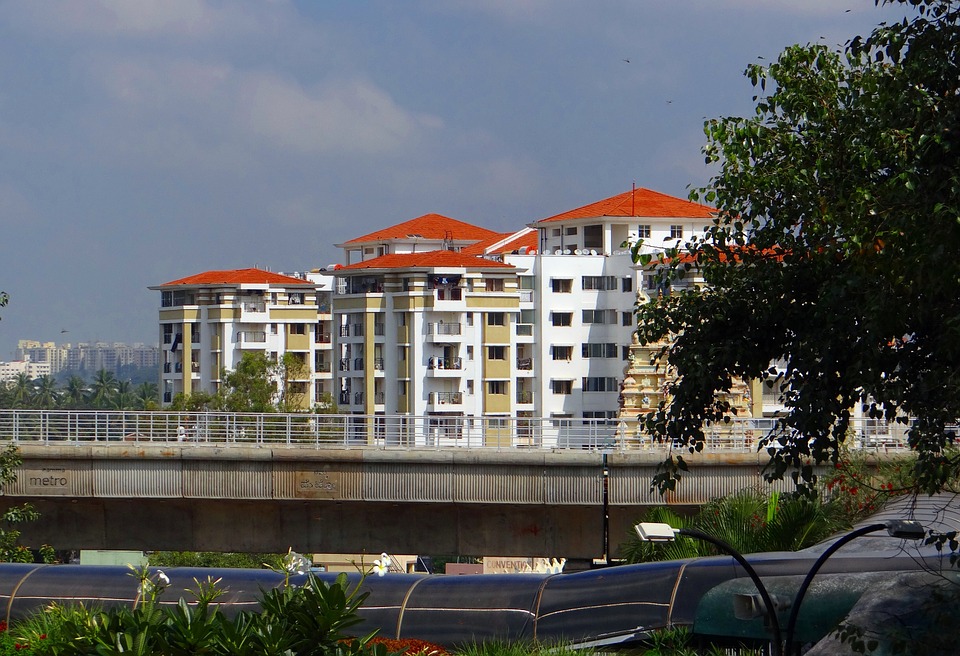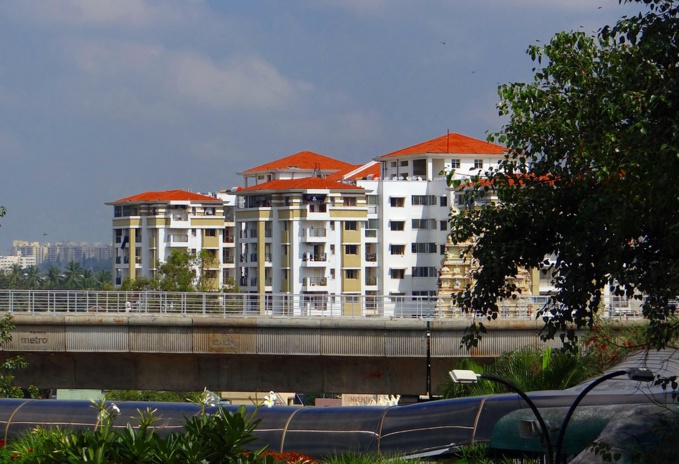1. Bangalore, India
Increase in the number of ultrarich in the next five years (forecast): 40%
Number of ultrarich in 2018: 98
Indian cities are often overshadowed by Mumbai’s success. However, Knight Frank predicts that Bangalore will destroy this stereotype. Data from Oxford Economics, one of the leaders in global forecasting, shows that over the next five years, the Bangalore GRP will grow by almost 60%. This city is often called the "Indian response to Silicon Valley." Bangalore is known for its achievements in the field of IT. There are companies such as Flipkart (which occupied 39.5% of India’s market in the e-commerce industry in 2017), Infosys (the second largest Indian IT company) and Wipro (an international corporation with headquarters in India, provides services in information technology, consulting and business processes). More than 400 multinationals, including Microsoft, Hitachi and Samsung, have placed their offices there.
2. Hangzhou, China
Increase in the number of ultrarich in the next five years (forecast): 34%
Number of ultrarich in 2018: 732
According to Oxford Economics, over the past five years, the market for transport, storage, information and communication services in Hangzhou has more than doubled and is projected to grow by another 46% over the next five years. This growth has led to an increase in the number of ultrarich living in the city by 25% in five years. Now in Hangzhou there are 26 companies with a capitalization of more than $ 1 billion. The city is located in the center of the Yangtze River Delta, just an hour by high-speed train from Shanghai. A well-developed network of rail, road and air routes allows easily accessing any place in China.
3. Stockholm, Sweden
Increase in the number of ultrarich in the next five years (forecast): 23%
Number of ultrarich in 2018: 559
Stockholm is strengthening its position as one of the most innovative cities in the world. According to Knight Frank, the number of ultrarich in this city will increase by 2018-2023 by 23%. In 2017, the European Commission called Stockholm the most innovative city in Europe. Many transnational corporations like Spotify were founded here. In addition, Stockholm ranks second in the global talent competitiveness index INSEAD 2018, which assesses the city’s ability to retain and attract employees. Over the past five years, the number of employees in Stockholm has increased by 8%. According to forecasts, in the next five years this figure will grow by another 7%.
4. Cambridge, UK
Increase in the number of ultrarich in the next five years (forecast): 19%
Number of ultrarich in 2018: 68
One of Europe’s high-tech clusters, Cambridge is considered the British response to Silicon Valley. In 2017, the turnover of high-tech business (IT companies grown in the Silicon Valley) amounted to 2.4 billion pounds sterling, or 152,000 pounds sterling per employee. The highest level of specialists who studied at the University of Cambridge, along with the presence of well-known research centers and a network of technological enterprises, make the city attractive to investors. Here you can find market giants such as Apple, Microsoft and Amazon that are developing innovative technologies. Seeing growing popularity of the city, the Cambridge Council plans to build about 14,000 new homes by 2031. There are serious investments in infrastructure: in 2017, a new railway station was opened, and another one is planned to open in 2021. By 2025 the metro line, named after Isaac Newton, is expected to be launched.
5. Boston, USA
Increase in the number of ultrarich in the next five years (forecast): 15%
Number of ultrarich in 2018: 68
Boston is a relatively affordable alternative to investing in New York and San Francisco. Unlike these already established markets, Boston has fewer startups, which makes competition for raising capital less fierce. In the period from 2015 to 2017, Boston received venture capital investments worth $ 24.5 billion and ranked fifth in the world according to this indicator, says the American Enterprise Institute. The city was rated by such giants as Google, Amazon, Facebook and Uber. Boston has a huge potential for attracting talent, because there are two famous universities - Massachusetts Institute of Technology (MIT) and Harvard, which are ranked fourth and sixth in the world ranking of The Times in 2019.
source: knightfrank.com, forbes.com
Increase in the number of ultrarich in the next five years (forecast): 40%
Number of ultrarich in 2018: 98
Indian cities are often overshadowed by Mumbai’s success. However, Knight Frank predicts that Bangalore will destroy this stereotype. Data from Oxford Economics, one of the leaders in global forecasting, shows that over the next five years, the Bangalore GRP will grow by almost 60%. This city is often called the "Indian response to Silicon Valley." Bangalore is known for its achievements in the field of IT. There are companies such as Flipkart (which occupied 39.5% of India’s market in the e-commerce industry in 2017), Infosys (the second largest Indian IT company) and Wipro (an international corporation with headquarters in India, provides services in information technology, consulting and business processes). More than 400 multinationals, including Microsoft, Hitachi and Samsung, have placed their offices there.
2. Hangzhou, China
Increase in the number of ultrarich in the next five years (forecast): 34%
Number of ultrarich in 2018: 732
According to Oxford Economics, over the past five years, the market for transport, storage, information and communication services in Hangzhou has more than doubled and is projected to grow by another 46% over the next five years. This growth has led to an increase in the number of ultrarich living in the city by 25% in five years. Now in Hangzhou there are 26 companies with a capitalization of more than $ 1 billion. The city is located in the center of the Yangtze River Delta, just an hour by high-speed train from Shanghai. A well-developed network of rail, road and air routes allows easily accessing any place in China.
3. Stockholm, Sweden
Increase in the number of ultrarich in the next five years (forecast): 23%
Number of ultrarich in 2018: 559
Stockholm is strengthening its position as one of the most innovative cities in the world. According to Knight Frank, the number of ultrarich in this city will increase by 2018-2023 by 23%. In 2017, the European Commission called Stockholm the most innovative city in Europe. Many transnational corporations like Spotify were founded here. In addition, Stockholm ranks second in the global talent competitiveness index INSEAD 2018, which assesses the city’s ability to retain and attract employees. Over the past five years, the number of employees in Stockholm has increased by 8%. According to forecasts, in the next five years this figure will grow by another 7%.
4. Cambridge, UK
Increase in the number of ultrarich in the next five years (forecast): 19%
Number of ultrarich in 2018: 68
One of Europe’s high-tech clusters, Cambridge is considered the British response to Silicon Valley. In 2017, the turnover of high-tech business (IT companies grown in the Silicon Valley) amounted to 2.4 billion pounds sterling, or 152,000 pounds sterling per employee. The highest level of specialists who studied at the University of Cambridge, along with the presence of well-known research centers and a network of technological enterprises, make the city attractive to investors. Here you can find market giants such as Apple, Microsoft and Amazon that are developing innovative technologies. Seeing growing popularity of the city, the Cambridge Council plans to build about 14,000 new homes by 2031. There are serious investments in infrastructure: in 2017, a new railway station was opened, and another one is planned to open in 2021. By 2025 the metro line, named after Isaac Newton, is expected to be launched.
5. Boston, USA
Increase in the number of ultrarich in the next five years (forecast): 15%
Number of ultrarich in 2018: 68
Boston is a relatively affordable alternative to investing in New York and San Francisco. Unlike these already established markets, Boston has fewer startups, which makes competition for raising capital less fierce. In the period from 2015 to 2017, Boston received venture capital investments worth $ 24.5 billion and ranked fifth in the world according to this indicator, says the American Enterprise Institute. The city was rated by such giants as Google, Amazon, Facebook and Uber. Boston has a huge potential for attracting talent, because there are two famous universities - Massachusetts Institute of Technology (MIT) and Harvard, which are ranked fourth and sixth in the world ranking of The Times in 2019.
source: knightfrank.com, forbes.com



















